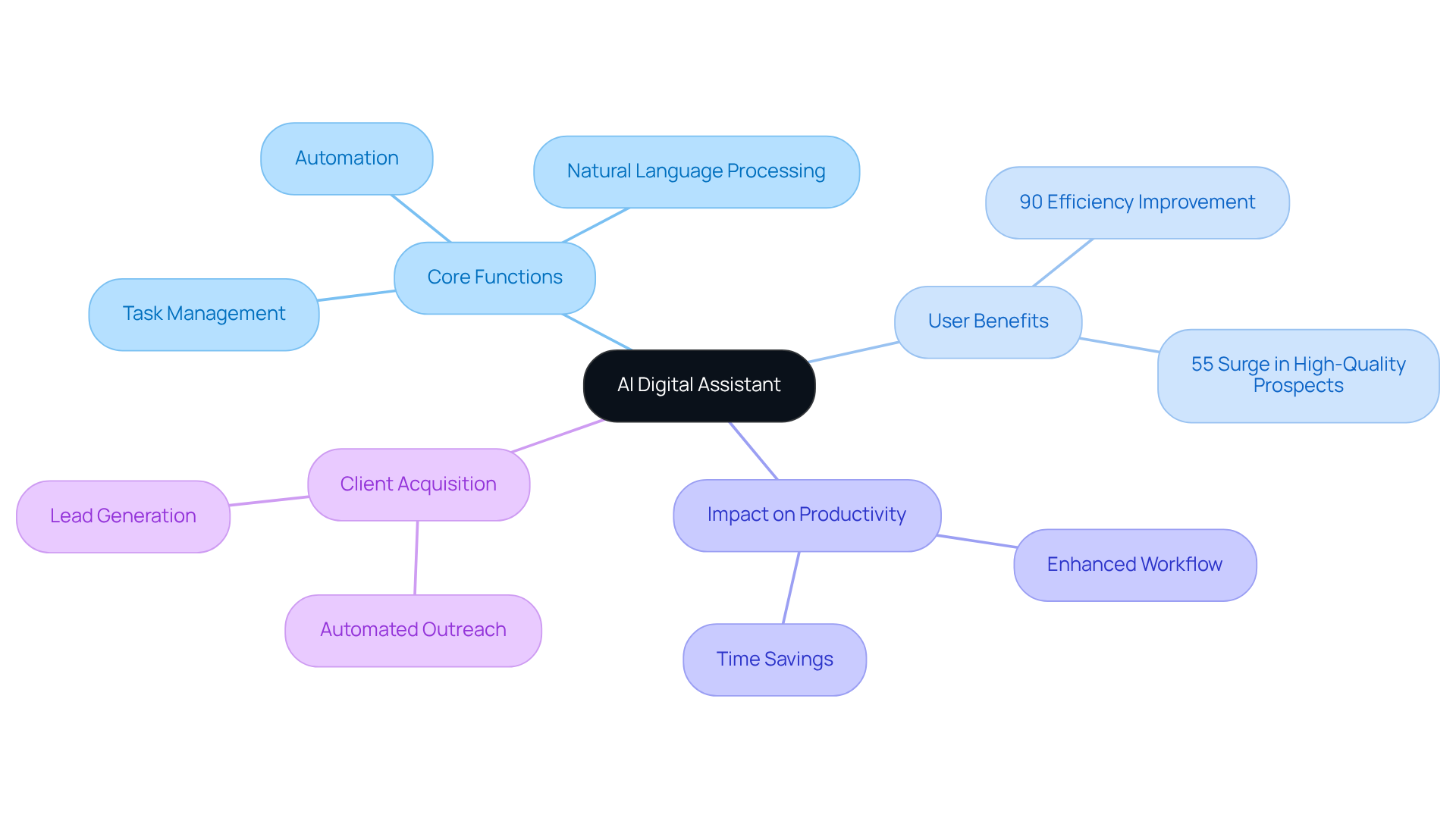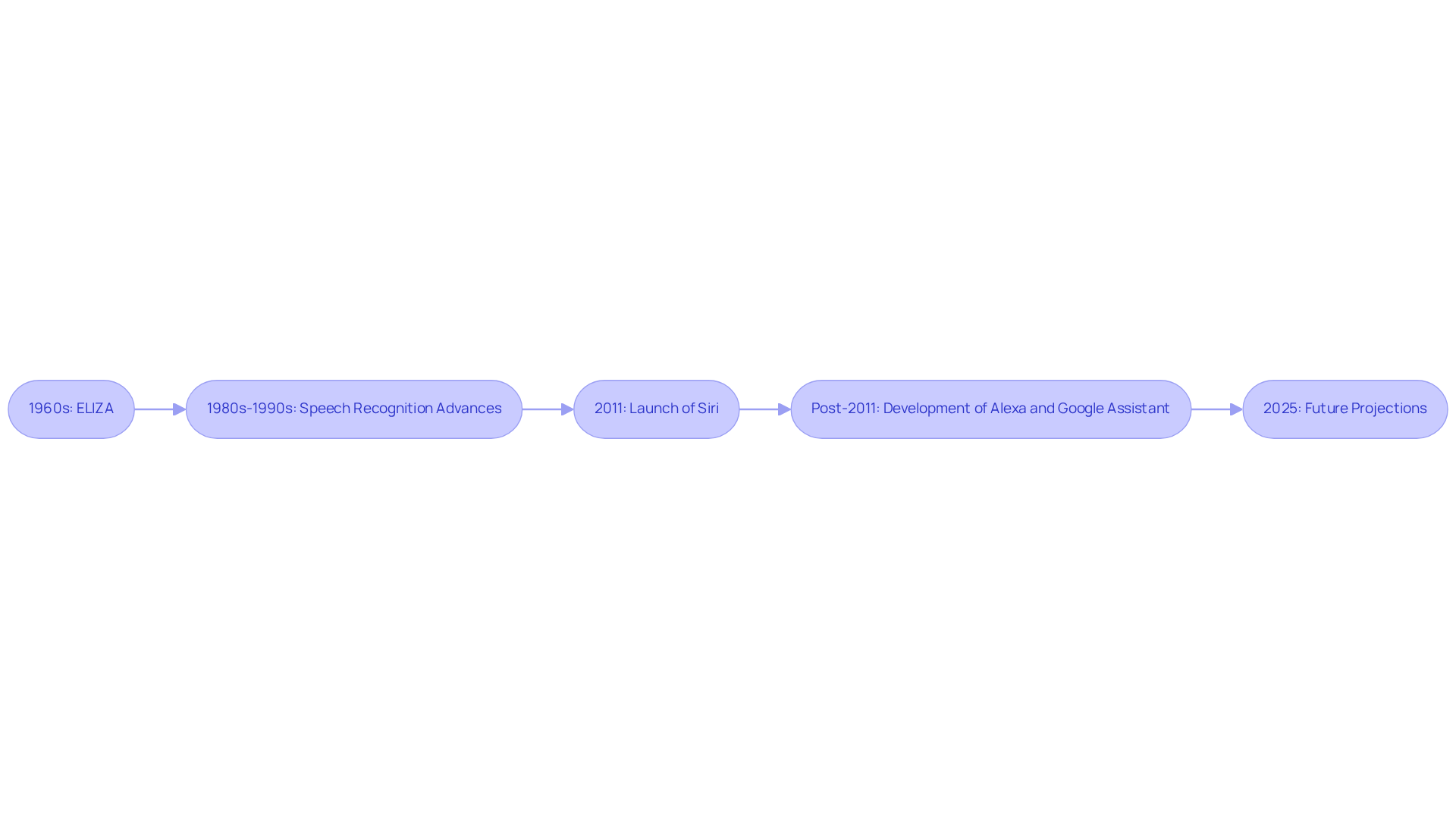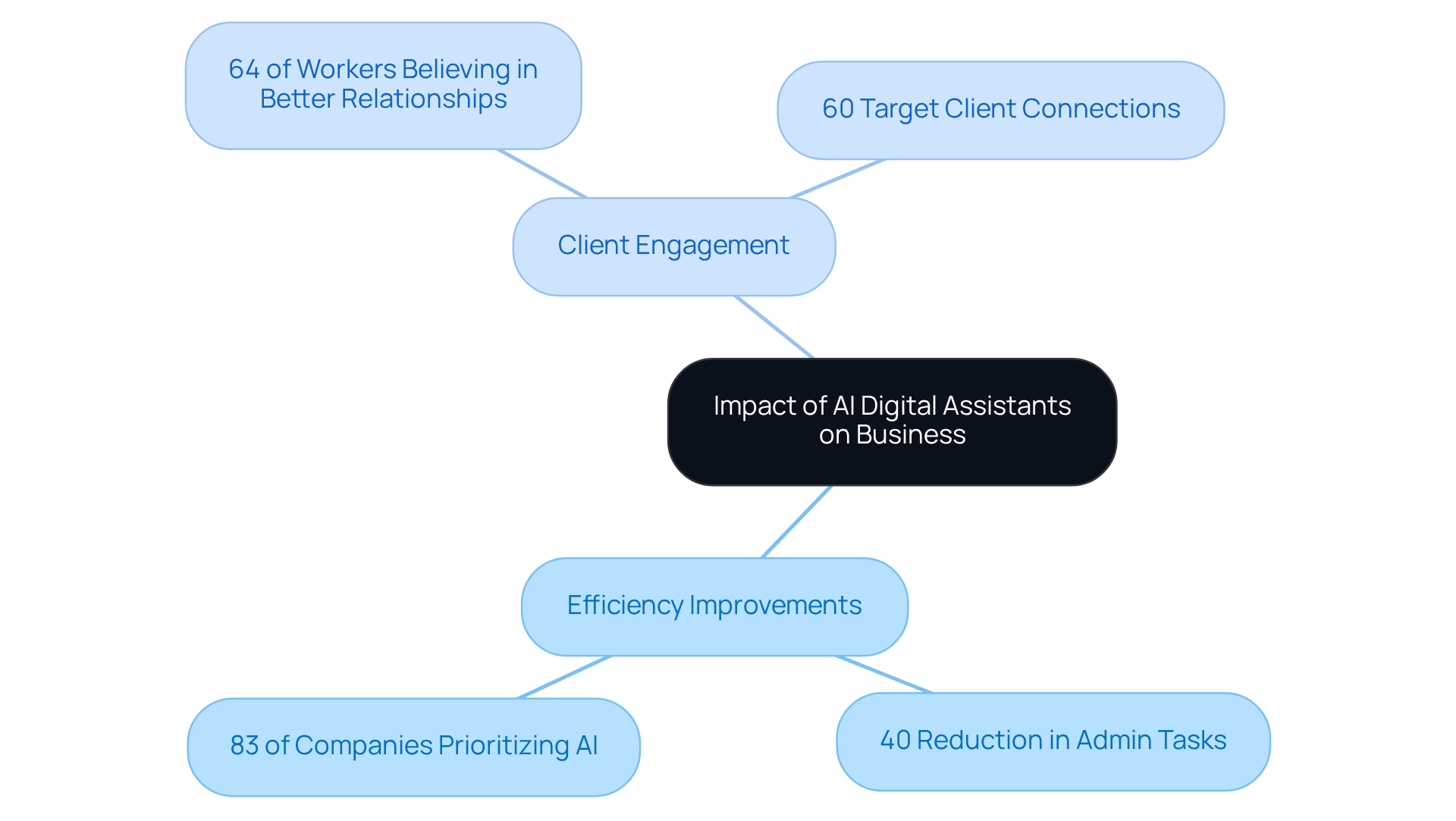Overview
AI digital assistants are here to support you. These software applications, powered by artificial intelligence, help users like you perform tasks, manage schedules, and streamline workflows through natural language processing and machine learning. Imagine having a tool that not only enhances your efficiency but also understands your needs. In fact, 90% of users report feeling more productive with these assistants by their side.
As a small business owner, you may often feel overwhelmed by the demands of client acquisition and engagement. AI digital assistants are becoming increasingly important in automating these processes, allowing you to focus on what truly matters—building relationships and growing your business. Together, we can navigate these challenges, ensuring that your business thrives in a competitive landscape.
Consider how incorporating an AI digital assistant could transform your workflow. By streamlining your tasks, you can reclaim valuable time and enhance your overall productivity. Embracing this technology is not just about efficiency; it’s about empowering yourself to achieve greater success. Let's explore these possibilities together.
Introduction
AI digital assistants are truly transforming the way businesses operate, bringing remarkable efficiency and productivity through advanced technology. These virtual aides harness the power of artificial intelligence to handle a wide range of tasks, from managing schedules to enhancing client interactions. For small business owners, they are becoming invaluable assets that can alleviate some of the daily pressures they face. Yet, as reliance on these tools increases, it’s natural to wonder:
- How can businesses effectively integrate AI digital assistants into their operations?
- What challenges might arise in this rapidly evolving landscape?
Together, we can explore these questions and find ways to navigate this exciting journey.
Define AI Digital Assistant: Core Concepts and Functions
An AI digital assistant, often called a virtual aide, is a software application designed to assist you by utilizing artificial intelligence. These tools carry out tasks, answer your questions, and streamline your workflows, all while understanding your instructions—be it verbal or written—through natural language processing (NLP) and machine learning algorithms. Imagine having a reliable assistant that can schedule your appointments, handle your emails, offer customer support, and manage various administrative tasks, significantly boosting your productivity and efficiency in both your personal and professional life.
For small business owners like you, platforms such as Wayy.ai illustrate how an AI digital assistant can transform your client acquisition processes. By automating outreach and lead generation, these tools empower you to concentrate on what truly matters—your core activities. Wayy.ai offers features like a one-click sales playbook and , enabling you to connect with over 60 potential clients each month. Plus, with daily performance insights, you receive email updates highlighting key metrics, such as the number of leads reached, who expressed interest, and improvements in your conversion rates. This automation not only saves you precious time but also expands your network of potential clients.
The impact of AI digital assistants on productivity is profound. Research shows that:
- 90% of users report enhanced efficiency in their daily tasks.
- 55% of companies utilizing virtual helpers experience a surge in high-quality prospects, showcasing their effectiveness in enhancing client acquisition efforts.
As AI technology continues to evolve, integrating it into your small business operations is becoming essential for staying competitive and fostering growth. As Albert Badalyan insightfully notes, '90% of AI users indicate enhanced efficiency in their daily tasks,' highlighting the significant role AI support tools play in boosting productivity. Together, we can harness these advancements to navigate your business challenges and achieve success.

Trace the Evolution of AI Digital Assistants: Historical Context and Milestones
The evolution of AI virtual helpers is a journey that began in the 1960s with ELIZA, a pioneering chatbot created by Joseph Weizenbaum at MIT. While ELIZA was able to simulate conversation, it didn't truly understand the nuances of human interaction. Fast forward to the advancements in speech recognition during the 1980s and 1990s, which laid the groundwork for more interactive systems that we rely on today.
A pivotal moment arrived in 2011 with the launch of Apple's Siri. This innovation integrated voice recognition with AI capabilities, allowing users to perform various tasks with ease. As we reflect on this progress, it's clear that these developments have paved the way for later virtual helpers like Amazon's Alexa and Google Assistant. These tools utilize advanced machine learning methods to enhance conversational abilities and task performance, making them invaluable resources.
By 2025, AI virtual helpers are expected to play a crucial role in various applications, from customer support to personal productivity. This advancement signifies a remarkable leap in technology and user engagement. The worldwide , valued at $4.2 billion in 2023, is projected to reach $11.9 billion by 2030. This growth highlights our increasing reliance on these resources in our daily lives.
Moreover, the chatbot market is growing at a CAGR of 24.4%, indicating a significant shift towards automation in operational processes. We understand that as small business owners, navigating these changes can feel overwhelming. However, expert opinions suggest that AI digital assistants not only simplify processes but also enhance customer interaction. They are becoming essential tools for small enterprise owners striving to thrive in today's competitive landscape by utilizing an AI digital assistant.
Together, we can embrace these advancements and utilize them to foster success in our businesses. How might these AI tools help you streamline your operations and connect better with your customers?

Identify Key Features of AI Digital Assistants: Capabilities and Applications
Truly remarkable tools like the AI digital assistant can transform your business operations. With their sophisticated , task automation, and contextual awareness, they interpret commands, manage schedules, and provide real-time data insights that can make your life easier. For instance, consider how Wayy.ai leverages task automation to streamline outreach processes, helping small business owners like you connect with potential clients more effectively.
Imagine receiving daily email updates that deliver key metrics on the number of leads reached, interest expressed, and improvements in conversion rates. With Wayy.ai, you can enhance your sales performance by seeing precisely what is working each day. This clarity not only empowers you but also allows you to focus on what truly matters for your business.
Moreover, AI digital assistants are designed to learn from every interaction, continuously enhancing their replies and suggestions over time. Their ability to integrate with various applications means you can enjoy seamless workflows and personalized experiences tailored to your preferences. These attributes not only boost your productivity but also elevate client involvement and satisfaction.
In a world where small enterprises strive for growth, AI virtual helpers have become essential resources. We understand your challenges, and together, we can achieve success by embracing these innovative solutions that support your journey.
Examine the Impact of AI Digital Assistants on Business Efficiency and Client Engagement
AI digital assistants can truly transform the way organizations operate, enhancing efficiency by automating repetitive tasks. This allows employees to focus on strategic initiatives that matter most to them. Imagine being able to reduce the time spent on administrative tasks by up to 40%—this is a reality for many companies using AI tools, as highlighted by various studies. Moreover, these AI digital assistants foster better client engagement by delivering timely responses and personalized recommendations based on user behavior. In fact, a recent survey found that 64% of workers believe AI will enhance customer relationships.
Consider firms like Wayy.ai, which empower small business owners to forge over 60 target client connections each month without the burden of manual effort. This not only streamlines the client acquisition process but also nurtures meaningful relationships, ultimately leading to higher conversion rates and stronger customer loyalty. With 83% of companies prioritizing the AI digital assistant in their business strategies, it’s clear that is significant.
However, it’s important to recognize the concerns some leaders have; 76% of CEOs express worries about the lack of transparency in the AI market. This highlights the pressing need for responsible AI practices. Together, we can navigate these challenges and harness the power of AI to achieve greater success.

Conclusion
AI digital assistants mark a significant turning point in how individuals and businesses operate, harnessing advanced technology to boost productivity and streamline workflows. These virtual aides not only automate routine tasks but also empower users to concentrate on strategic initiatives, leading to substantial improvements in efficiency across various domains. By integrating natural language processing and machine learning, AI digital assistants have become vital tools for enhancing client engagement and fostering business growth.
In this article, we have traced the evolution of AI digital assistants from their beginnings with early chatbots to the sophisticated systems we now recognize, such as Siri and Alexa. We highlighted key features of these assistants—task automation, contextual awareness, and the ability to learn from user interactions—as essential elements for enhancing productivity and client satisfaction. Moreover, statistics have illuminated the positive impacts of these tools, such as reducing administrative workloads and strengthening customer relationships, showcasing their value in today’s business landscape.
As the reliance on AI digital assistants continues to expand, it is imperative for small business owners to embrace these innovations to stay competitive. By leveraging these technologies, organizations can optimize their operations while nurturing deeper connections with their clients. The future of business efficiency is in the hands of those who are ready to integrate AI digital assistants into their strategies, paving the way for a more productive and engaged workforce. Together, we can navigate these changes and achieve greater success.
Frequently Asked Questions
What is an AI digital assistant?
An AI digital assistant, also known as a virtual aide, is a software application that uses artificial intelligence to assist users by performing tasks, answering questions, and streamlining workflows through natural language processing (NLP) and machine learning algorithms.
How can an AI digital assistant benefit small business owners?
AI digital assistants can transform client acquisition processes by automating outreach and lead generation, allowing small business owners to focus on core activities. They offer features such as one-click sales playbooks and targeted outreach to connect with potential clients.
What specific features does Wayy.ai provide as an AI digital assistant?
Wayy.ai provides features like a one-click sales playbook, targeted outreach to connect with over 60 potential clients each month, and daily performance insights that include email updates on key metrics such as leads reached and improvements in conversion rates.
What impact do AI digital assistants have on productivity?
AI digital assistants have a profound impact on productivity, with research indicating that 90% of users report enhanced efficiency in their daily tasks and 55% of companies using virtual helpers experience an increase in high-quality prospects.
Why is it becoming essential for small businesses to integrate AI technology?
Integrating AI technology into small business operations is essential for staying competitive and fostering growth, as it helps businesses navigate challenges and enhance productivity.




